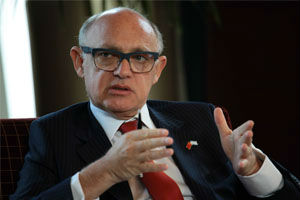Selection of SOE heads
Updated: 2013-11-21 07:14
(China Daily)
|
|||||||||||
As a way of increasing the vitality and competitiveness of its sprawling State-owned enterprises, China's State-owned assets watchdog and other relevant departments plan to grant SOEs more power, so that instead of receiving those senior executives appointed by superior State departments, they can select the most qualified personnel, Xinhua News Agency reports.
This will enable SOEs to link the pay of their senior executives to their performance. There have been public outcries in recent years involving the handsome salaries paid the heads of some SOEs despite the poor performance of their enterprises. To ease the public's concerns and establish a modern corporate system based on market rules, China's SOEs need to introduce some first-class business managers and set up a market-based salary mechanism.
Despite the pledge from the Third Plenum of the 18th Central Committee of the Communist Party of China that there will be wider policy space for the choosing of heads of SOEs, there is still a big concern about how much say the market will enjoy in the process.
Resolving this problem entails finding answers to two questions: How many, or which, SOEs are empowered to choose their heads through the market? And will related personnel departments really delegate their power to the market? It should be made clear, for example, how many of China's 113 central enterprises can recruit their heads and other senior staff from the market.
The selection of top executives will also mean the country's powerful organizational authorities have to transfer some of their vested personnel power to the market and corporate boards of directors. But which one will have the final say if disagreements emerge?
For a better solution, China should deepen reforms of its State-owned assets management system and the government should shift its focus from personnel management to assets management.
The country should further define the boundary between the market and government supervision and management, one that will unavoidably touch the yields of some vested interest groups. It should be aware that giving the market a larger say will help SOEs acquire better managers and the government will be able to provide better public services and look after the public's interests better.
(China Daily 11/21/2013 page8)
Related Stories
China's SOE profits rise 10% 2013-11-20 19:18
Profits at China's SOEs rise 10.1% 2013-11-20 17:22
China's SOE reforms promising, says pundits 2013-11-19 19:33
More options to be given to local SOEs in debt issuance 2013-11-15 07:40
On the road to reform China's SOEs 2013-11-12 14:20
SOE reforms to be launched after plenum 2013-11-11 07:29
Today's Top News
Rupert Murdoch, wife reach divorce deal
Xi seeks greater China-EU cooperation
Spokesmen system expands in army
SCO meeting to focus on anti-terror
Roadmap 'will curb local debts'
Govt mulls measures to reform
Obama's rating drops to all-time low
In Asia-Pacific, HIV still high, report says
Hot Topics
Lunar probe , China growth forecasts, Emission rules get tougher, China seen through 'colored lens', International board,
Editor's Picks

|

|

|

|

|

|





